- Home
- Annette Blair
Skirting the Grave Page 2
Skirting the Grave Read online
Page 2
—KARL LAGERFELD
I placed the phone on its charger and rubbed my arms. Isobel York hadn’t started interning yet, and one of her theoretical relatives—who did not sound the least loving—had already scared the wooly knobby knits out of me.
Brandy, Brandy, Brandy. What do you know about this friend of a friend from the Peace Corps?
Typical Brandy. Don’t get me wrong. I’ve missed my sister in a lot of ways. And her self-absorption came with a generous work ethic toward helping the children of the world.
But get her in range of home, and she became the six-year-old who lost her mother, expecting the world to revolve around her . . . and her causes. In the process of returning for Sherry’s baby shower, she hadn’t just talked me into taking on an intern; she’d imposed on me to do the prep work for several of her fund-raisers.
Not only did I agree to mentor a stranger in my shop, my father agreed to house the new intern, two promises that frightening phone call made me regret.
True, Isobel is practically paying me to take her on. She’s giving me a huge trunk of her grandmother’s vintage clothing, which I might or might not accept, depending on Isobel’s attachment to them. That I won’t know until she arrives.
The trunk itself already complemented my art deco sitting area, teasing me with its hidden treasure, especially with the key in an old manila-type pay envelope tied to the lock with a yellow ribbon.
Looking retro but well-kept, covered in pale blue antiqued alligator, it was banded with copper strips on both sides, each topped with a molded lion head.
I wanted to look inside in the worst way, but I swore it would remain closed until Isobel arrived.
I hadn’t wanted an intern, but I couldn’t wait for Isobel to open the trunk. Me, I can’t afford to get any inadvertent psychometric vibes from the vintage clothes inside—little trick I picked up, against my will, from my mother the witch. Story for another day.
Neither do I want to become embroiled in Isobel York’s family secrets, which often happens with my spontaneous and unexpected visions, though that phone call had shoved me into a parallel rock and a hard place.
Yes, some vintage clothes sort of “speak” to me and take me to places they’ve been, albeit in my mind, where I see snippets of the past, a scary kind of day tripping, I can tell you.
To be fair, I haven’t read a piece of vintage clothing in months. So, perhaps—hopefully—if it pleased whatever deity controlled these things—possibly Buddha, and Yoda, too—my psychometric phase had passed.
An unexpected whiff of chocolate hit me, a sign my mother’s spirit hovered, along with a clear vision of her laughing, and I sighed. Not a phase, then.
In self-defense, I turned my attention from that tempting trunk to the problem at hand.
Well, problems, plural: my intern for one, my psychic gift for another, and the ethical need to tell Nick, my FBI boy toy, about a kiss I shared with Werner, though, sewing circle oath, Werner and I were in a sleep-induced, half-unconscious state at the time.
My only other problem would be, you guessed it: Brandy, my bohemian sister. She who set me up as neatly as if she tied me, wrists and ankles, with a fat polka-dot bow, turquoise, maybe, with big magenta dots. Gaudy and tasteless, just to rub my face in it. I could see the funky bow in my mind’s eye as if Brandy used it like a glove to slap my face.
But I never could resist a challenge, baste it.
Chakra, my butterscotch striped kitty, who, since the first time I picked her up, calmed me at my jittery solar plexus, vaulted onto my lap to cuddle, so, beat by beat, my angst receded.
“Thanks, sweetie.” I stroked her behind her ears, her purr like a lullaby. “I needed that.” With her in my arms, I tried to put my concerns into perspective.
I should anticipate the adventure ahead of me with Brandy’s special events rather than dread her effect on my daily routine. After all, she hadn’t caused chaos or panic in ages. How could she, halfway across the world?
My cell phone vibrated, revealing Brandy as my caller. I answered, since she was due home at some point tonight, and I needed to pick her up at the train station.
“Mad,” she said. “Isobel and I aren’t coming in on the same train after all. Some goofy bass-toned bureaucrat called my apartment and sent me on a wild-goose chase to sign missing Peace Corps termination papers, and on my way, I got mugged. My bag got torn right off me. My neck’s killing me.”
“Oh, no. Are you all right?”
“Couple aspirin, some muscle cream, and I’ll be fine. But it was all for nothing. My termination papers weren’t missing.”
I so hoped the bass-toned bureaucrat wasn’t Isobel’s very own Wrath Vader. “What are you going to do without your purse?”
“Backpack. Cops found it in a trash can a couple blocks down, everything inside but my train ticket. Doesn’t matter. I had already missed the train. Isobel will have boarded in D.C., expecting to connect with me when I boarded here in New York, so she’ll be there before me, like maybe five minutes ago? Be a dear and pick her up at the station, will you? Look for me around six thirtyish?”
“Pick up Isobel now? Bran, this is the middle of my workday. You didn’t even ballpark me on the time.”
“Didn’t I? Hmm.” She hung up, just like that, assuming I’d take care of everything.
Justified, I acknowledged without guilt the validity of my angst. How could I have forgotten for a deluded moment the way Brandy—bossy and with a smile—tended to spark chaos among the family, making the most flexible of us smolder and sometimes burn?
I was betting that Professor Harry Cutler, my eventempered father, would be the first to blow.
Three
I base my fashion sense on what doesn’t itch.
—GILDA RADNER
I clapped my phone shut.
Okay, so the mix-up wasn’t my sister’s fault, but she could have called at the time she missed the train, rather than six and a half hours later, five minutes after I was supposed to meet it.
Suppose I had . . . customers . . . a doctor’s appointment . . . my car in the shop?
Ticking off beneath my breath a lifetime of similar incidents, I crated Chakra for the few minutes I’d be gone, locked the shop, and backed my Honda Element from the lot.
I’d had it painted lavender to match my building, with a small replica of my sign painted on its side: Vintage Magic in bold white on an eggplant shield. Behind the name stood a pale lavender side silhouette of a woman who could be Jackie O.
It was like my calling card, and people waved whenever they saw it.
I waited to turn left, from Bank Street to Main, noting the brisk business at Mystic Pizza, fast-moving as always, unlike the snail-crawling traffic on Main.
While I waited, I tried not to judge my worldtraveling middle sister for her foibles, though being me, I couldn’t help but wince at her wardrobe choices. Brandy subscribes to the Gilda Radner school of fashion, which many would call smart.
I am not one of them.
Brandy is comfortable in her skin and needs no outer trappings to feel good about herself. I envy that, to a point. Me, I’m still willing to itch a little for a smart look or the right guy. Well, make that two right guys. I groaned and touched my forehead. That sure makes me the stable one.
As for Brandy’s personality, well . . . in the same way that I, Madeira Cutler, am my mother’s daughter, psychic abilities and all, my sister Brandy—third Cutler, but second daughter—resembles . . . no one, really.
While Brandy denies the existence of the metaphysical gifts mom left me and scoffs at my love of vintage fashion, she’s not beyond soliciting my wealthy clients to seed her newest and most worthy cause, which will require a lot of work in the next few days . . . on my part.
They are worthy, Brandy’s causes; I mean that. But they are also many and oft-changing.
Where my father, the English professor, quotes literary greats, Brandy quotes philanthropists and world hunger organizatio
ns. I admire her for her generosity, thoughtfulness, and fortitude and for giving up her eternal stint in the Peace Corps to raise money for a good cause.
To be fair, she planned her fund-raising trip to coincide with our sister Sherry’s baby shower next Sunday. Well, Brandy did delay the event a little with her schedule, but we’re still safe having it in June, because the baby isn’t due until July.
Sherry’s father-in-law, Justin Vancortland IV, aka Cort, is lending Brandy his property—gatehouse, manse, lawns, and gardens—for Saturday’s fund-raiser. The day will feature a ride on Scotland’s famous MacKenzie Carousel on world tour and a fifties car show with models dressed in the style of the decade. It’ll culminate that evening with a fifties dress ball and bachelor auction. An altogether fun event, if I can get past planning it.
Brandy and Cort shared barbs at Sherry’s wedding. She ribbed him for his wealth. Cort, to give him credit, gave as good as he got. They made fine sparring partners, not to mention dancing and dinner partners, as well. The thing is: I dressed Brandy for Sherry’s wedding. Nuff said.
Cort seemed to appreciate Brandy’s zeal for solving world hunger, so much so that he gave her a hefty donation. Better than good cooking as a way to Brandy’s heart. Sure, nearly two decades separated them. But Brandy was an old soul, if ever I’d met one, and the Peace Corps had a way of maturing people beyond their years. Secretly, I thought they complemented each other, but hey, playing cupid wasn’t my forte.
Bottom line, they’d connected on several levels, deeper than a donation could accomplish. But to pick up where they left off might entail an itchy outfit or three and shoes that didn’t flip when Brandy flopped.
Still stuck on Bank Street with my car idling, I was steaming for so many reasons. With my luck, some three-masted schooner was waiting for the Department of Transportation to raise the Mystic River Drawbridge so it could sail into the Fishers Island Sound beyond the harbor—a sight I found spectacular on a good day, which would not be today by any stretch of the imagination, mystic, psychic, or spastic.
Yes, in case you haven’t guessed, the Mystic River Drawbridge sits square between me and the Mystic Train Station.
Stopping for a slow-moving sailboat would put me at the train station at, oh, twenty-five minutes past rude. Not a good way to meet your new intern, with both of you steaming.
Isobel York, according to Brandy, had applied for a fashion design reality show more than once and never quite made it. She’d attended fashion school between modeling jobs and was supposed to be a talented designer.
So why be my intern?
“She wants to learn at the hands of a master.” That’s the scrap Brandy handed me, anyway. Yeah, barf.
Isobel, an independent, sought-after fashion model, works regularly for a top modeling agency, and she conned her wealthy boss, Madame Celine Robear, into attending Brandy’s fund-raiser.
Sure, Robear has an iffy rep, but having the modeling mogul in attendance will be a coup for Brandy in her new role as development director for the Nurture Kids Foundation. And I get to utilize the models Madame Celine is bringing for the fifties car show and as usherettes for the bachelor auction.
Traffic opened; I nudged my way onto Main, and luck stayed with me. The drawbridge remained down, and the seagulls skirting the grave in traffic, while scrabbling over spilled fries, would live to be roadkill another day.
Despite expectations to the contrary, I reached my destination two and a half minutes early, though the train—always late—beat me.
This must be a cold day in hell.
Mystic’s train station projected a quaint landmark beauty. Small and painted cream, its Victorian architectural trim a rusty orange, it was used as a model for a toy train terminal by American Flyer in the fifties.
I parked in the lot, waited, and remembered that only passengers on the southbound trains exited station side. Meanwhile, the northbound motored to life and disappeared around the bend, revealing a swarm of motion across the tracks. A humming throng faced into the open-front, three-sided platform shelter where commuters waited in bad weather.
While one or two focused arrivals—places to go, things to do—cut across the tracks bisecting Broadway Avenue, they first had to skirt an ambulance, shelter side, its spinning bubble light speeding my heart.
My sudden panic became rooted in strange phone calls, and I sprinted along Broadway to the opposite side of the tracks, re-creating a scene from Up the Down Staircase as I flowed against the disembarking crowd. An unconscious girl lay on the bench in the commuter shelter, paramedics checking her vitals.
An unexpected shiver of unease scuttled through me.
Presiding over the scene: Detective Lytton Werner, or “Little Wiener” as I’d dubbed him in third grade. Call ours a grudging relationship, except when awareness sizzled, as it unfortunately did one “thermonuclear night”—his words.
He gave me a double take. “Madeira, don’t tell me you know this girl?”
“Never saw her before. But I won’t kid you; for a half a sec, I feared it was Brandy.” Relief flooded my senses. “I’m here to pick up my new intern. Name’s Isobel. Anybody ask directions?” I glanced back across the tracks toward the terminal, shading my eyes from the sun.
“Isobel?” Werner asked. “Isobel who?”
“Isobel York,” I said.
At the instant set of his lips, I nearly tripped over my own feet. He led me away from the crowd.
“What?” I asked, stopping, unable to wrap my mind around his sudden handle-with-care attitude.
“Mad,” Lytton said. Jaw set, he looked over at the medics, and moved his hand from my arm to the flat of my back to turn me and block my peripheral vision, the warmth of his hand, his ploy and nearness rushing pinpricks to my limbs.
“We checked her ID, Mad. That’s Isobel York on the bench. She didn’t make it.”
Four
Women are now more comfortable with themselves and their bodies—they no longer feel the need to hide behind their clothes.
—DONNA KARAN
“No,” I said, reeling. “My Isobel York”—the intern I hadn’t wanted in the first place—“can’t be dead. She’s coming to work with me. She’s young and vibrant and alive.”
“You’re in denial,” Werner said. “That’s normal. It’s okay.”
“Don’t patronize me!” I jerked my hand from his grasp so hard, he looked appalled, like I’d turned on him, while he rubbed his wrist as if he’d twisted it or I had.
He took a count-to-ten breath, as if he needed patience . . . or a weapon. “Madeira, I understand that you’re upset,” he said, “but—”
I glanced back at the poor soul on the bench. “You know what? That girl can’t be my intern.”
I could almost see steam rising from his collar. “Okay, Madeira, I’ll bite. Why can’t she be your intern?”
“Isobel York is a fashionista, a glamazon. But this girl is wearing yoga pants, a peasant blouse, and ankle socks with jelly sandals. And her purse; well, I can only describe that as an electric blue plastic Prodo.”
“What’s a Prodo?”
“Neither a Prada nor a fashion statement.”
Werner shrugged. “Her socks are peach like her peasant blouse.”
As if that made her fashionable.
“Yeah, red shoes and peach socks.” I brushed the hair from my eyes. “I rest my case.”
“Maybe she’s poor.”
“Poor, not blind. But she isn’t . . . poor, I mean. I’m guessing a fashion plate walked out of this crowd without her wallet, though she doesn’t know it yet.”
Werner looked around. “I don’t see a fashion plate waiting for a ride, Mad.” He gave his assistant a nod with a double gimme palm-up curl of his fingers.
Billings handed him a Coach Wallet. Werner opened it and showed me the dead girl’s driver’s license. Isobel York, it said, and her picture, well . . . I stepped closer to the body—I mean, the girl—to compare it to her face, trying
not to focus on those hard-set blue lips or the purpling beneath her eyes and unpolished fingernails.
“They’re . . . identical.” A feeling of abject helplessness rose in me. I turned from the sight, and when Werner put an arm around my waist to walk me away from the crowd once more, I took full advantage of his support, not sure I could have made it on my own.
“Sorry to be such a pain, Detective. I feel . . . responsible. Entirely so. Like she . . . died on my watch.” True, I’d never met her and she’d died before reaching me, but still, I’d hired her, and now she was dead. “Lytton, what happened to her?”
“You mean, how did she die?” Werner asked. “That’s not readily apparent. You know that pinpointing cause of death can be a maze of thorns, with a—you’ll excuse the pun—dead end or two along the way.”
I stepped back. “Is that how you see your job?”
He gave me a look filled with meaning. “Only when I work with you.”
Whoa, I thought, trying to pull my gaze from his. Did that make me exciting? Or a pain in the butt seam?
His steely regard reminded me that his hands and mouth knew me better than he did.
I shivered and hated myself for it.
“Well,” he said, “I guess my job isn’t all thorns and free falls. Sometimes there’s thermonuclear activity.”
I could deny it till doomsday, and yet the magic of his signature scent, Armani Black Code, mixed with his particular male musk revved my libido even now. “You can retire your Geiger counter, Detective.” Liar, liar, don’t preach to the choir.
“We’ll see,” he said with an eye twinkle that disappeared fast, his attention suddenly on his notebook. “Any idea where Ms. York boarded the train?”
“Washington, D.C., I believe.”
“Time of death will tell us if she made it to this spot from the train on her own or if someone carried her here.” He eyed me for a minute. “It’ll also tell us where she died. She could have been killed in Baltimore, Philadelphia, New York, or New Jersey, which would mean that her body was transported across state lines. You know what that means. Puts a whole new perspective on the investigation.”

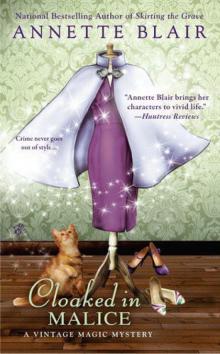 Cloaked in Malice
Cloaked in Malice UNFORGETTABLE ROGUE (The Rogues Club, Book Two)
UNFORGETTABLE ROGUE (The Rogues Club, Book Two) Unmistakable Rogue
Unmistakable Rogue Butterfly Garden
Butterfly Garden Jacob's Return
Jacob's Return Vampire Dragon
Vampire Dragon A Winter Heart, Sexy Amish Historical Novella
A Winter Heart, Sexy Amish Historical Novella Scandalous Brides
Scandalous Brides Untamable Rogue (Formerly: A Christmas Baby)
Untamable Rogue (Formerly: A Christmas Baby) Captive Scoundrel
Captive Scoundrel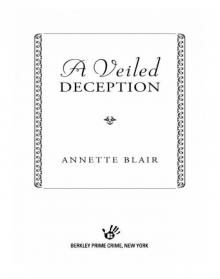 A Veiled Deception
A Veiled Deception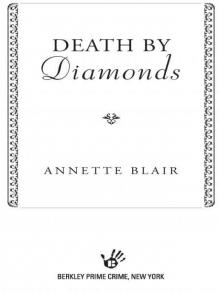 Death by Diamonds
Death by Diamonds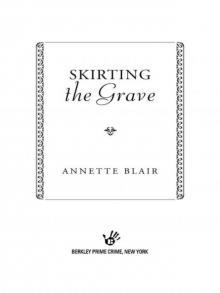 Skirting the Grave
Skirting the Grave Sex and the Psychic Witch
Sex and the Psychic Witch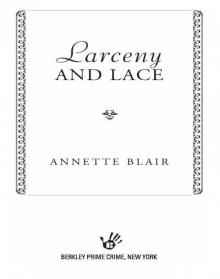 Larcency and Lace
Larcency and Lace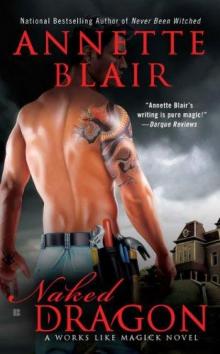 Naked Dragon
Naked Dragon Undeniable Rogue (The Rogues Club Book One)
Undeniable Rogue (The Rogues Club Book One) Proper Scoundrel
Proper Scoundrel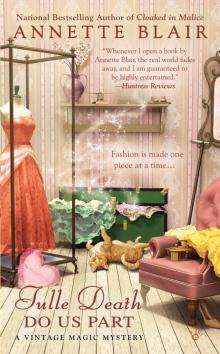 Tulle Death Do Us Part
Tulle Death Do Us Part